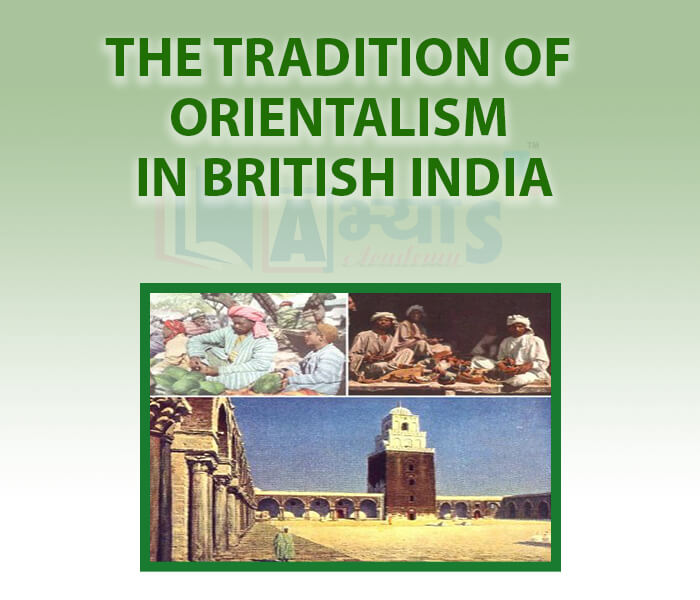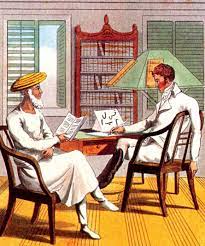The Tradition of Orientalism in British India









The Tradition of Orientalism in British India
The main objective of the East India Company was to make profits and notto take over the responsibility of educating Indians. Though the missionaries opened a few English schools, their main purpose was to promote Christianity. Later on British in India wanted not only territorial conquest and control over revenues, but also felt that they had a cultural mission: they had “civilize the natives”, change their customs and values. Some minute steps were taken to reform the education sectoir in India, but the first major step was the Charter of India Act 1813, which granted one lakh rupees for the education in India.
In 1835, Thomas Macaulay (Member of Legislative Council) said " We must do our best to form a class who may be interpreters between us and the millions of people, who would be Indian in blood and colour, but English in taste and opinion." The British decided to take steps in the field of education in India. But a controversy arose between the Orientalists and the Anglicists regarding the medium of education.
The Orientalists favoured the traditional system with Sanskrit and Persian as the medium of instruction while Anglicists favoured English as the medium of instruction.

British and the Tradition of Orientalism:
The attitude towards Colebrooke and William Jones towards India:
Influenced by such ideas, many company officials argued that the British ought to promote Indian rather than western learning. They felt that institutions should be set up to encourage the study of ancient Indian texts and teach Sanskrit and Persian literature and poetry. The officials also thought that Hindus and Muslims ought to be taught what they were already familiar with, and what they valued and treasured, not subject that were alien to them. Only then, they believed, could the British hope to win a place in the hearts of the “natives”; only then could the alien rulers expect to be respected by their subjects.
With this object in view a Madrasa a was set up in Calcutta in 1781 to promote the study of Arabic, Persian and Islamic law; and the Hindu college was established in Banaras in 1791 to encourage the study of ancient Sanskrit texts that would be useful for the administration of the country.
On the other hand, some British officials were in strong criticism of the Orintalists and favoured Anglicits.

WILLIAM JONES LEARNING PERSIAN.

Students / Parents Reviews [20]
The experience was nice. I studied here for three years and saw a tremendous change in myself. I started liking subjects like English and SST which earlier I ran from. Extra knowledge gave me confidence to overcome competitive exams. One of the best institutes for secondary education.

Aman Kumar Shrivastava
10thWhen I have not joined Abhyas Academy, my skills of solving maths problems were not clear. But, after joining it, my skills have been developed and my concepts of science and SST are very well. I also came to know about other subjects such as vedic maths and reasoning.

Sharandeep Singh
7thWe started with lot of hope that Abhyas will help in better understnding of complex topics of highers classes. we are not disappointed with the progress our child has made after attending Abhyas. Though need to mention that we expected a lot more. On a scale of 1-10, we would give may be 7.

Manya
8thIt has a great methodology. Students here can get analysis to their test quickly.We can learn easily through PPTs and the testing methods are good. We know that where we have to practice

Barkha Arora
10thAbhyas institute is one of the best coaching institute in the vicinity of Ambala cantt.The institute provides good and quality education to the students.The teachers are well experienced and are very helpful in solving the problems. The major advantages of the institute is extra classes for weak...

Shreya Shrivastava
8thI have spent a wonderful time in Abhyas academy. It has made my reasoning more apt, English more stronger and Maths an interesting subject for me. It has given me a habbit of self studying

Yatharthi Sharma
10thIn terms of methodology I want to say that institute provides expert guidence and results oriented monitering supplements by requsite study material along with regular tests which help the students to improve their education skills.The techniques of providing education helps the students to asses...

Aman Kumar Shrivastava
10thAbhyas is a complete education Institute. Here extreme care is taken by teacher with the help of regular exam. Extra classes also conducted by the institute, if the student is weak.

Om Umang
10thIt was good as the experience because as we had come here we had been improved in a such envirnment created here.Extra is taught which is beneficial for future.

Eshan Arora
8thA marvelous experience with Abhyas. I am glad to share that my ward has achieved more than enough at the Ambala ABHYAS centre. Years have passed on and more and more he has gained. May the centre flourish and develop day by day by the grace of God.

Archit Segal
7thMy experience with Abhyas academy is very good. I did not think that my every subject coming here will be so strong. The main thing is that the online tests had made me learn here more things.

Hiya Gupta
8thAbhyas is good institution and a innovative institute also. It is a good platform of beginners.Due to Abhyas,he has got knoweledge about reasoning and confidence.My son has improved his vocabulary because of Abhyas.Teacher have very friendly atmosphere also.

Manish Kumar
10thMy experience with Abhyas is very good. I have learnt many things here like vedic maths and reasoning also. Teachers here first take our doubts and then there are assignments to verify our weak points.

Shivam Rana
7thMy experience with Abhyas academy is very nice or it can be said wonderful. I have been studying here from seven class. I have been completing my journey of three years. I am tinking that I should join Abhyas Academy in tenth class as I am seeing much improvement in Maths and English

Hridey Preet
9thUsually we see institutes offering objective based learning which usually causes a lag behind in subjective examinations which is the pattern followed by schools. I think it is really a work of planning to make us students grab the advantages of modes of examination, Objective Subjective and Onli...

Anika Saxena
8thAbhyas institute is one of the best coaching institute in the vicinity of Ambala Cantt area. The teachers of the institute are well experienced and very helpful in solving the problems of the students.The good thing of the institute is that it is providing extra classes for the students who are w...

Aman Kumar Shrivastava
10thAbhyas is an institute of high repute. Yogansh has taken admission last year. It creates abilities in child to prepare for competitive exams. Students are motivated by living prizes on basis of performance in Abhyas exams. He is satisfied with institute.

Yogansh Nyasi
7thAbhyas Methodology is very good. It is based on according to student and each child manages accordingly to its properly. Methodology has improved the abilities of students to shine them in future.

Manish Kumar
10thThird consective year,my ward is in Abhyas with nice experience of admin and transport support.Educational standard of the institute recumbent at satisfactory level. One thing would live to bring in notice that last year study books was distributed after half of the session was over,though study ...

Ayan Ghosh
8thAbhyas academy is great place to learn. I have learnt a lot here they have finished my fear of not answering.It has created a habit of self studying in me.The teachers here are very supportive and helpful. Earlier my maths and science was good but now it has been much better than before.
